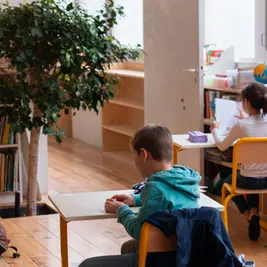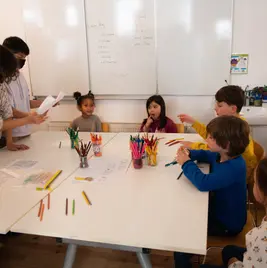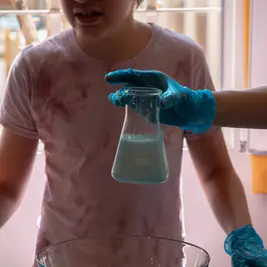
Our educational project
The Lab School Paris is an innovative, bilingual, united, secular, and eco-responsible school. It supports children in acquiring knowledge, skills, and culture from the Ministry of Education’s curriculum, while paying particular attention to the development of socio-emotional skills (creativity, critical thinking, collaboration, empathy, etc.). It aims to transform pupils into responsible, enlightened, autonomous, supportive, and blooming citizens.
Hybrid pedagogy
The pedagogy of the Lab School Paris relies on a hybrid approach, that is to say it is a synthesis inspired by contributions from different approaches. On the one hand, it draws on the contribution of pioneers in educational innovation, such as Maria Montessori, Célestin Freinet, John Dewey, Alexander Neill or Rudolf Steiner. On the other hand, it uses the current research in educational sciences and in other fields such as psychology, sociology, neuroscience, philosophy and anthropology. It functions in collaboration with the pedagogical council and the researchers of the Lab School Network. The educational team takes into account studies which scientifically evaluate teaching practices -both from the point of view of academic success and one’s well-being at school- and put them into work with children.
Co-teaching
The teaching team functions in pairs of French and English-speaking teachers.
The supervision ratio is one teacher for a maximum of 15 children.
Give it a try!

Primary school at Lab School
Primary school pupils are divided into four different groups, in double grades: 1st/2nd grade, 3rd/4th grade, 5th/6th grade.
Pupils in 6th grade participate in the 5th/6th grade class group, but are counted as middle schoolers and pay the middle school rate.




46 rue de Montreuil - 75011 PARIS

School Routines
The Lab School follows the Paris academic calendar.
Mondays, Tuesdays and Thursdays are full days, and Wednesdays and Fridays are mornings only.
On certain days, workshops are available after classes, as well as a day-care option. You can find all the information you need about after-school care on the “After-school care” page.
Lunch break up to 6th grade
is from 12 to 2 p.m.
Classes start and end times
1st and 2nd grades :
Mondays, Tuesdays and Thursdays, 8:30am to 4.15pm,
Wednesdays and Fridays from 8:30am to 12pm.
3rd and 4th grades :
Mondays, Tuesdays and Thursdays, 8:40 a.m. to 4:15 p.m,
Wednesdays and Fridays from 8:40am to 12pm.
5th grade :
Mondays, Tuesdays and Thursdays, 8:50 a.m. to 4:30 p.m,
Wednesdays and Fridays, 8:50am to 12pm.
School rhythm

The school rhythm and the work organization are partly inspired by Montessori pedagogy, which includes long periods of work. We tailor the learning process to the child's pace and learning style.
The materials we use often allow for self-correction, and we encourage collaborative learning and peer tutoring.
The teachers are not trained in Montessori pedagogy, but use its materials, as well as other concrete elements for learning.
8:40 - 11:45:
fundamental learning
From 8:30 am: welcoming
Children are welcomed with their parents. This first moment ensures a smooth transition between home and school, while encouraging exchanges with the team and families.
12pm - 2pm :
lunch and outing to the park
Meals are served in the classrooms. Lunch is taken together with members of the educational team. It's a time for exchange and learning in its own right. Parents are welcome to join us for lunch (bringing their own lunch) from time to time, and help supervise the meal. Recess takes place in a nearby park.
From 4:15pm: end of the day
The school day ends at 4:15pm. Daycare and extracurricular activities are available for parents who wish to pick up their children later.
2pm: project-based learning
The organization of school time takes into account children's biological rhythms. Numerous studies show that the early afternoon is the least favorable time for new learning requiring attention.
After recess, a moment of relaxation is offered, followed by various activities, in groups or on their own, to reactivate fundamental learning: artistic practices, collaborative projects, yoga, scientific experiments, discovering different trades, etc.
This is also the time when children can review, at their own pace, concepts they haven't yet fully assimilated in class, or view reverse classroom capsules.



























